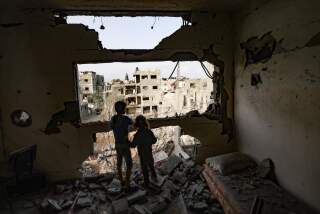Terrorist’s Alleged Death as Mysterious as His Life
- Share via
JERUSALEM — If terror mastermind Abu Nidal is indeed dead, how did he die?
The aging Palestinian, one of the Middle East’s most notorious killers of Jews, Israelis, Westerners and other Arabs, reportedly was found dead in a Baghdad apartment over the weekend.
Some said it was suicide. But reports said he had multiple bullet wounds. He had been ill. He was hated by many.
The purported demise of Abu Nidal was announced in a two-paragraph item at the top of the front page of Monday’s Al Ayyam newspaper, published in the West Bank and circulated in Jerusalem. Al Ayyam is edited by a close confidant of Palestinian Authority President Yasser Arafat, one of countless enemies who would like to see Abu Nidal dead.
Senior officials of Arafat’s Palestine Liberation Organization, especially those who advocated negotiating with Israel, were among Abu Nidal’s many victims through the years.
Palestinian officials confirmed Abu Nidal’s death to reporters at Arafat’s headquarters. But the terrorist’s family, including a brother in the West Bank city of Nablus, expressed doubts. And a deputy in Damascus, Syria, denied the report.
Abu Nidal, which means “father of the struggle,” is the nom de guerre of Sabri Banna, born 65 years ago in Jaffa in what was then British-ruled Palestine. His well-to-do family fled to the West Bank after Israel declared independence in 1948, and then to Saudi Arabia after the 1967 Middle East War, when Israel captured the West Bank.
Once regarded by the U.S. government as the most dangerous terrorist group in existence, Abu Nidal’s organization had been much less active in recent years. His death, if confirmed, was not expected to change today’s violence in the Middle East or the state of international terrorism, experts here said. But it would represent a symbolic closing of one of the bloodiest chapters in the history of the Middle East.
“The world would certainly be a better place without people like Abu Nidal,” State Department spokesman Philip T. Reeker said in Washington.
Abu Nidal was essentially the Osama bin Laden of his day, a ruthless killer whose name became synonymous with terrorism. A master of disguises and illicit finance, he was a mysterious figure whose whereabouts and activities had always been the stuff of rumors.
He broke with Arafat’s PLO in 1974 because it wasn’t radical enough for him. Initially, he was based in Iraq and worked with intelligence officials in attacking Iraq’s Syrian rivals. At the same time, he was building his own Revolutionary Council of Fatah.
Never one to let loyalty get in the way, Abu Nidal switched sides in 1983 and worked under Syrian auspices to strike out at Arab states attempting rapprochement with Israel.
Abu Nidal commandos attacked synagogues in Europe, hijacked or bombed international airliners, shot up restaurants and hotels, and assassinated diplomats the world over. Hundreds of people were killed or wounded in attacks in 20 countries throughout the 1970s and ‘80s and into the early 1990s.
Two days after Christmas in 1985, in his most infamous assault, Abu Nidal deployed suicide squads armed with machine guns and grenades to the airports of Rome and Vienna. Simultaneously, they strafed the ticket counters of Israel’s El Al airlines, killing 20 people, including five Americans.
“Abu Nidal was the ‘ultimate terrorist’: cruel, uninhibited, efficient and devoid of ideology,” Yossi Melman, a commentator for the Israeli Haaretz newspaper and author of a book on Abu Nidal, said Monday. “In the 1970s and 1980s, he was considered something of a Bin Laden, a man of terror who had his hand in everything.”
Melman described Abu Nidal as a “terror contractor” who served many masters. He worked for the Iraqis against Syria, the Syrians against Jordan, and the Libyans against a variety of opponents, Melman said. In return for his services, he received money, intelligence, logistical assistance and cover.
Though it is believed that he never attacked inside Israel, Abu Nidal was responsible for the 1982 attempted assassination of an Israeli ambassador in London, Shlomo Argov. That incident provided Israel’s defense minister at the time, current Prime Minister Ariel Sharon, with a pretext for invading Lebanon to oust Arafat’s PLO from Beirut.
Over the years, Abu Nidal killed key officials in the PLO, including several of Arafat’s closest associates.
The Palestinians sentenced him to death in absentia for what was reported to have been an attempt to assassinate Arafat.
U.S. officials said they believe that Abu Nidal moved to Iraq in 1999, given sanctuary by President Saddam Hussein after being booted from Egypt and Libya.
He had been rumored to have cancer or leukemia. Azzam Ahmad, the former Palestinian ambassador to Iraq, said in an interview that Abu Nidal had undergone at least two major heart surgeries.
Speculation was abundant about how and why Abu Nidal died. Several Palestinian reports, including the Al Ayyam story, suggested that he had committed suicide--but it didn’t explain how he could have shot himself more than once. The reports suggested that he had been despondent over his illness.
Other theories suggested that he was killed by a Palestinian rival settling old scores, or by his Iraqi hosts. Hussein is said to be trying to stave off an American attack and might have decided that Abu Nidal was too much of a liability.
“Since most security apparatuses in the world haunt the man, any information about him or his followers brings about waves of rumors and guesses as to his whereabouts,” Reuven Paz, an Israeli expert in counter-terrorism, wrote after the rare arrest two years ago of a member of the Abu Nidal group.
Halima Nimer was apprehended by Austrian police as she tried to withdraw the equivalent of $7.5 million from a bank in Vienna.
*
Times staff writer Michael Slackman in Amman, Jordan, contributed to this report.
More to Read
Sign up for Essential California
The most important California stories and recommendations in your inbox every morning.
You may occasionally receive promotional content from the Los Angeles Times.













